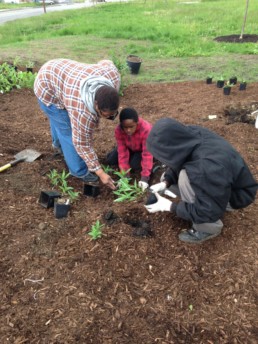Going Beyond Green at the Neighborhood Level
Year Complete: 2016
Grant Amount: $25,000
Local Government: Toledo-Lucas County
Local Foundation: Toledo Community Foundation
Project Purpose
To create a resident-led demonstration project in the Overland Park neighborhood to mobilize citizens across the county to take actions that promote sustainability within their own neighborhoods.
Key Lessons Learned
Lessons learned about tools and tactics through the project that other sustainability directors could use to advance their work.
Residents were deeply concerned with the beautification of their community and the safety of their water supply, especially given Toledo’s 2014 water crisis. Increased green space was a natural domain in which the county-wide sustainability plan aligned with neighborhood interests. The community leaders of Old West End Neighborhood Initiatives, who were largely older, working class men and women of color embraced the lexicon of sustainability and green infrastructure as a tool for community revitalization. It served as a source of new investment in their neighborhood.
It was easy for people from all walks of life to rally around sustainability efforts that represented new investment in their community. Residents in the Overland/Old West End neighborhood wanted to see things change for the better and they understood that brownfield redevelopment, green infrastructure and place-making projects were ways that they could help to drive resources to their neighborhood, which had suffered from years of disinvestment.
Lessons for developing a collaborative process between a local government sustainability director and local place-based foundation(s).
The Sustainability Commission and Foundation staff found that with a small amount of funding, it was possible to stimulate new thinking about the possibility of revitalization in a neighborhood long-overlooked by institutional leaders. The involvement of players from different disciplines, including planning, landscape architecture, environmental, and arts (as well as the public and private sectors) meant that significant time needed to be spent with the professional players in building trust and learning about the ways in which each other think about how to solve problems.
With certain disciplines, it is natural to put the voice of the residents first, and in others, it is not necessarily natural. Even for those who have many years of experience in public planning processes, it was important to challenge assumptions and ensure that all participants were on board with putting the residents in the driver’s seat. The involvement of the Foundation in influencing that aspect of the project was important. The end result increased social capital on both sides – for residents as well as for institutional leaders and professionals. Through this process, relationships built between leaders, professionals, and neighborhood leaders and residents, lead to mutual respect and understanding.
Additional Information and Resources
This project provided a platform for requisite action, which resulted in a range of projects – walkable and bike friendly streets, neighborhood beautification, nature habitat restoration, and employment outcomes. Read a profile on the success of this project here.

